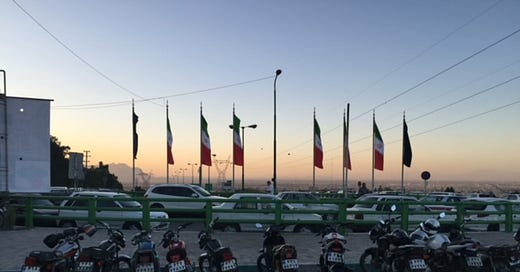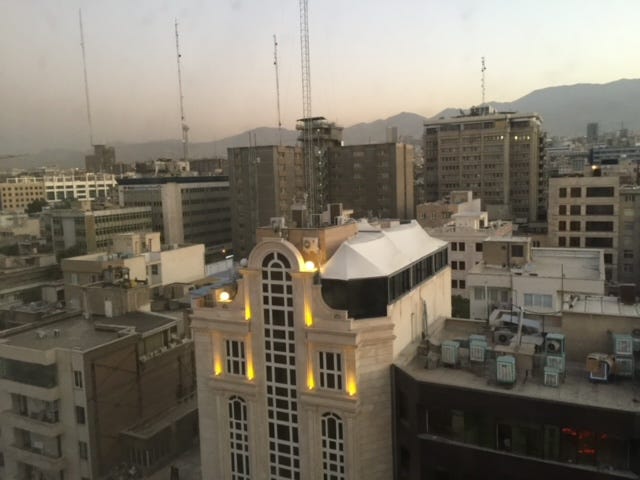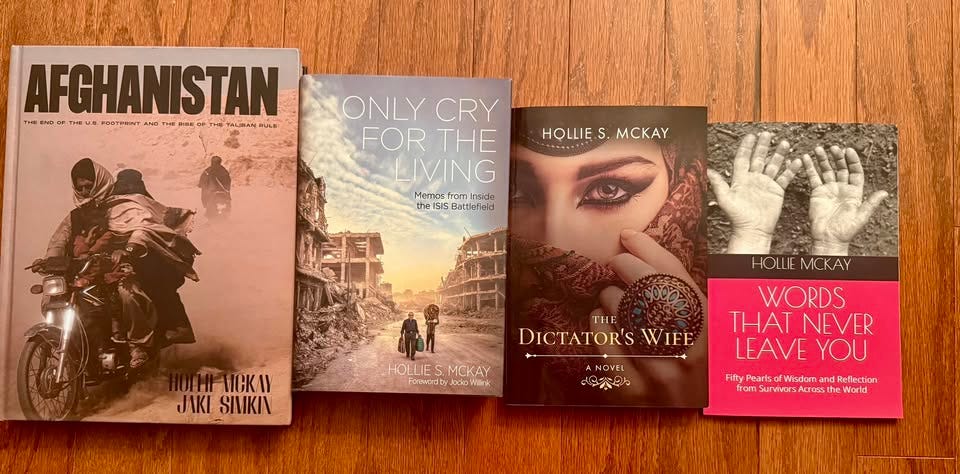Late Summer, 2017
Weeks earlier, on a sleepless Saturday night, I had reached out to a friendly Iranian tour operator. She told me I could get a visa on arrival as an Australian—but only after securing “a code.” I was honest about my work as a journalist, and even she was surprised when the code was approved. Elated, I wired the non-refundable deposit to their Hong Kong office and booked Emirates flights to Tehran via Dubai.
And then the panic set in. I avoided any headlines about westerners jailed as political prisoners. Rogue regimes—unlike terrorist groups—scared me. They could take years of your life with impunity. I was thirty-one. What if they robbed me of the chance to have a child? I never imagined myself a mother, but I didn’t want that choice taken away from me.
Still, I refused to cancel.
I withdrew a wad of cash—there are no ATMs in Iran for foreigners—and boarded the flight, praying I’d return to my cozy apartment in a few weeks. We landed in Tehran on a dusty Friday afternoon, the Muslim weekend. The airport, eerily quiet, looked like something out of Argo.
I paid for the mandatory health insurance and queued at the visa desk. I didn’t lie—just finessed. I wrote “writer” and listed “21st Century Fox” as my employer. That could mean anything. The man behind the counter eyed me warily, flipping through my passport. Behind the frosted glass, raised voices erupted. Then he appeared again, sternly asking what I wrote about.
“Everything—movies, art, travel,” I answered, trying to sound relaxed.
“And?” he pressed.
“Politics. Policy. The world,” I added, more timid now.
He returned behind the door. Everyone else had been processed. I sat alone on a plastic chair, praying I’d be sent back to Dubai if things went south. Again, I heard shouting—my name, clearly recognizable in Persian. The man returned and asked more questions. My travel stamps seemed to assure him of my globe-trotting ways. Then, without a word, he handed me my passport. I stared in disbelief: a visa for the Islamic Republic of Iran. I sprinted out.
“Hollie?” a man called. My driver. “I nearly left. What took you so long?”
In the gridlocked, smog-drenched drive through Tehran, past murals of Ayatollahs Khomeini and Khamenei, it hit me—I was here.
Tehran’s streets, dense with honking cars and coughing motorcycles, throbbed with chaos. My driver accidentally nudged a motorcyclist; they cursed each other and moved on. “Because of sanctions, we can’t get clean fuel,” he muttered. “Babies die of cancer because of this.”
At my hotel, the front desk took my passport and refused to return it until checkout—a standard rule, but jarring all the same. Unlike Americans or Brits, Australians are free to wander Iran unescorted. With my headscarf secured, I ventured into the Friday night streets. A man yelled at me from his car for walking alone as a woman.
The next morning, I met my tour guide, Mahnaz—a recent college grad with a boyfriend in Dubai. She wore a loose hijab, thick eyeliner, and long red nails. “I go to Dubai for shopping,” she whispered. “We take selfies without the hijab, post them in private channels.” She was worldly, funny, and candid.
We were joined by two British sisters, sweet and curious about Persian culture. I peppered Mahnaz with questions, unable to suppress my journalistic itch. Over ice cream and tea, she explained how guides must be certified and report on tourists daily. It was her subtle reminder: we were never really alone.
We roamed vibrant markets filled with spices and antiques, explored royal complexes like Shams-ol-Emarah, and dined on kebabs and saffron rice. I cautiously asked how locals viewed Evin Prison. In the West, it symbolizes repression. Mahnaz shrugged. “It’s just a prison.”
For the next two weeks, we journeyed across Iran on overnight buses. I marveled at the architecture of Yazd and the rooftops where boys played soccer at dusk. The anxiety never left me. I showered in the dark, changed beneath bedsheets, always aware this could go wrong at any moment. Still, I wanted to soak it in. I might never be back.
In Persepolis, once the ceremonial capital of the Achaemenid Empire, I ran my hands over ancient carvings. “Alexander burned this city,” Mahnaz said. “To us, he is not ‘the Great.’ Just Alexander.”
One day, under clear skies, we drove to Chak Chak—the most sacred shrine of Zoroastrianism. Before hiking to the fire temple, an Indian woman warned us: “If you are menstruating, do not enter. It will dry the spring.” None of us were. Inside, marble floors shimmered beneath eternal flames. I thought of the Yazidi and Zoroastrian families I’d met in Iraq—forever persecuted.
In Isfahan, I scribbled notes in cafes and slept in bed-and-breakfasts with timber cots. We visited the Armenian quarter, lit candles in Vank Cathedral, and listened to church bells echoing across courtyards. I asked about the Jewish quarter, but Mahnaz gently declined my request to go, fearing it might cause her trouble.
At night, under the golden arches of the city’s bridges, I watched couples flirt and smoke hookah by the river. They pulled me in, thrilled to meet an Australian. “How can we get out?” they asked. They longed for immigration pathways to the West. I said little. I didn’t have the heart to tell them the odds were slim.
Some offered alcohol. Curious, I sniffed a bottle—a pungent cocktail of rubbing alcohol and Coke. “What?” I blurted. “You’re drinking rubbing alcohol?” They laughed. To them, it was worth the risk. I'd once seen Kurdish smugglers near the Iran border in Iraq, hauling Armenian booze across treacherous mountains for pennies.
Iran is a writer’s dream—layered in history, contradictions, and impossible beauty. But it’s also heart-wrenching. A modern, vibrant generation is trapped in a theocracy unwilling to evolve, its youth eager to break free but caged by rules, rituals, and regimes that suffocate them.
On the final leg of our journey, we make our way to northern Fars Province and its picturesque capital, Shiraz—the city of flowers, poets, and literature. My eyes brim with tears at the marble Tomb of Hafez, standing tall amid lush gardens that honor the beloved poet. My childhood school library held musty-smelling volumes of Sufi Persian poetry, and I spent hours poring over the ruminations of Rumi, Saadi, and my favorite—Hafez Shirazi. Their expressions of wisdom felt eternal, cutting across time and place.
Mahnaz shares a traditional practice: ask yourself a pressing question, then close your eyes, open a page of Hafez’s collected works, and your answer will be there.
Before sleep, drifting in that space between wakefulness and dreaming, I ask that power greater than myself if I will be kept safe—and alive—for as long as I choose to follow this line of work. I flip open the Hafez book beside me.
“For I have learned that every heart will get what it prays for most.”
Our time in Shiraz feels rushed. The bold city offers so much, and time is too short. The British women on the trip suggest flying back to Tehran instead of taking the long, outdated train. Mahnaz calls the tour operator and explains that the British aren’t permitted to alter their itinerary once inside the country—but, as an Australian, I am. Still, I stick with my original plan and board the train, and I’m glad I did.
Painted baby blue on the outside, the sleeper train is cozy, with a private cabin, cushioned seats, and bunk-style cots for the 15-hour ride. Uniformed staff knock every few hours, offering simple boxed meals served on trays with hot tea, juice boxes, and petite cakes. From day to night and into morning again, we roll past the loping countryside, taupe hills, and cattle-dotted farms.
I haven’t checked my phone or email once during the trip. With just one day left, I turn on my VPN and scroll through a mountain of messages. Among them: a kind note from a U.S. Citizenship and Immigration Services representative, offering to arrange my citizenship interview at the New York office at any time I choose—regardless of the regular schedule.
I eagerly book it for the morning after I return. Then I wonder, with a touch of sorrow, if I’ll ever see this place again.
I tearfully say goodbye to the British sisters and Mahnaz, tucking a generous tip into her palm. She tries to give it back, embarrassed, but I insist—she’s earned it. I hope she finds her way to Dubai and the freedom to grow and dream.
I spend my final day in Tehran walking the dense, sun-drenched markets. It’s September, hot and heavy. I duck in and out of bakeries, inhaling the heady aromas of cardamom, sumac, and saffron. My flowing abaya sticks to me in the heat. Back at the hotel, with slanted floors and heavy purple drapes, I sink into the hard bed and flip on Iranian television: an old box set, cords spilling out, antennas stretching like limbs. Hurricane Irma is battering Florida. The Iranian state news features American “experts,” but each one seems to be a mouthpiece for anti-American propaganda. The consensus is clear: the terrorist U.S. is a failed state.
I feel comforted knowing I’m going home. I made it through without crossing the wrong line, despite my questions and occasional detours from the itinerary. I just need to clear immigration and board the Emirates flight.
The taxi driver to the airport is young and passionate—very much the Persian way. His name is Arash. He has two engineering degrees but says there are no jobs, so he drives a cab 12 hours a day. His voice is thick with emotion.
“Tell your people,” he pleads, “that we are not our government. We want to live free of religious pressure. We don’t hate Americans.”
I nod, though inside, I hesitate—careful again with what I say.
I think about how I was born free. I never had to fight for my freedom. I never had to earn it. Arash keeps talking, as if he hasn’t spoken deeply with anyone in years. He confides that sometimes they protest, but the regime hits back harder. And still—they’re willing to risk everything. Even their lives.
“Will anyone come for us?” he asks quietly. “Will the U.S. ever come?”
He writes his number on a piece of paper, asking me to return one day, when Iran is unshackled—and to bring something from America. I scribble in my notebook at the airport, trying to hold onto all I’ve seen. I underline the things I need to unlearn, too.
I’ve filled more than two dozen little black notebooks in my life—scattered across apartments and storage units. They are limbs of me, external extensions of my soul. My black boxes. Everything that matters lives inside.
I board the plane. Oddly, the seat I selected online isn’t mine. I’m stuck in a middle seat near the back. Too tired to argue, I let it go.
As we lift off into the still night sky, I think of that scene in Argo—the breathless relief as they clear Iranian airspace, when alcohol can finally be served. Tourism, or journalism, is not a crime. And yet, somewhere along the way, I became paranoid.
The suited man next to me introduces himself as Ali. He immediately starts peppering me with questions: Where did I go? Who did I talk to? Where did I stay? I answer politely at first, playing the part of a naïve Aussie backpacker. But his probing deepens. I flip the script.
“And what are you doing in Dubai?” I ask.
He fumbles. “Just turning around,” he mutters, unsure. Then he resumes questioning.
I’m drained. I put on my headphones and pretend to sleep until we land.
As we taxi to the gate, Ali says sternly, “It was nice to meet you, Hollie.”
I smile, sly. “Nice to meet you too, Ali. But I never told you my name.”
I flick my hair with a little theatrical flair and disappear, his jaw nearly hitting the floor.
I arrive in New York and collapse into bed, sleeping harder than I ever have. The tension of the past weeks—constant vigilance, suppressed fears, carefully chosen words—was more exhausting than a marathon. I think about the millions of people who endure that pressure every day. I can only imagine the strength it takes to live knowing that any moment could bring imprisonment, torture, or death. That kind of resilience is hard-earned. That kind of courage is rare.
The Persian people are not their government. Most are thoughtful, soulful, deeply intelligent, and full of warmth. From the cab drivers and market vendors to the scholars and poets they revere, they show again and again that theirs is a culture of beauty, complexity, and compassion. They deserve so much more—so much better—than the murderous, repressive regime they did not elect.
FOR EXCLUSIVE GLOBAL CONTENT AND DIRECT MESSAGING, PLEASE CONSIDER A PAID SUBSCRIPTION TO THIS SUBSTACK TO HELP KEEP INDEPENDENT, AGENDA-FREE WRITING AND JOURNALISM ALIVE. THANK YOU SO MUCH FOR YOUR SUPPORT.
For speaking queries please contact meta@metaspeakers.org
For ghostwriting, personalized mentoring or other writing/work-related queries please contact hollie@holliemckay.com
Follow me on Instagram and Twitter for more updates
Click to Purchase All Books Here








Timely and resonating piece - thank you
Some of the most gorgeous people I met in the Middle East - inside and out were Iranians. May this conflict be over quickly and free them from this despicable regime. The world needs a free Iran.